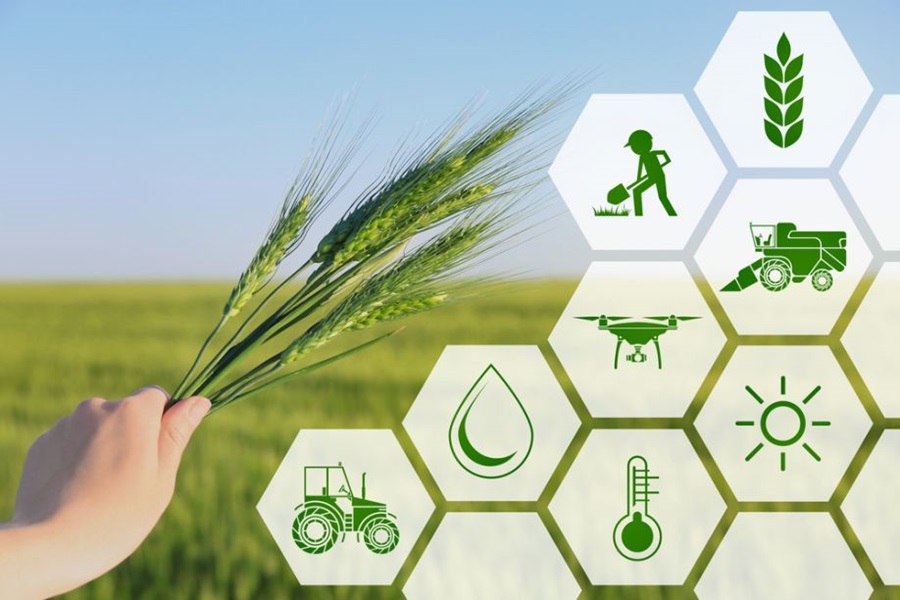Revolutionizing Agriculture: The Role of Artificial Intelligence
Implementation of Artificial Intelligence in Agriculture
Agriculture contributes significantly to the economy. Automation in sector of agriculture is an primary worry and developing topic of interest across all around the world. The population is rapidly growing, which raises the food demand and work. Traditional historical farming practices were insufficient to meet these objectives. Thus, automated approaches were introduced. These new techniques like AI met food requirements while also creating job opportunities for billions of people. Artificial intelligence has brought about a revolution in agriculture and food sector. This technology has protected crop yields from a variety of conditions, including climate change, higher and drastic population increase, job troubles and food security to all.
Impact of AI on Agriculture
AI-based solutions helps improving efficiency in all agricultural domain sectors while also managing the issues of numerous industries, including the agricultural sector, such as irrigation, crop production, soil nutrient sensing, crop pest monitoring, weeding and crop growth. Robots in agriculture are designed to bring high-value AI applications in the aforementioned field. With the world’s population increasing, the agriculture industry is in trouble. AI-based technology has helped farmers produce more with less input, enhance output quality, and accelerate crop yields to market. By 2020, farmers will utilise 75 million of all connected gadgets.
Image recognition and perception
Autonomous UAVs are used for a variety of applications, including recognition and surveillance using AI, human body detection and geotagging, search and rescue of living beings, and forest fire detection during summer. Drones or UAVs are becoming increasingly popular due to their versatility, imaging technology, ability to be used with a remote controller, and dexterity in the air. They can reach greater heights than normal humans and carry out various implementations.
Maximize the output
Quality determines the greatest performance. Emerging technology have improved crop selection and hybrid seed selections to better meet farmer needs. The implementation involves understanding the basic knowledge on the seeds behaviour to varied meteorological conditions and soil types. Gathering this information reduces the risk of pests and plant diseases. We can now meet our new market trends, consumer needs, enabling farmers to get higher crop returns.
AI And Application in Agriculture And Food Industries
The employment of machine learning algorithms is increasingly significant. In preproduction, ML systems are used to estimate crop output, soil parameters, and irrigation requirements. In the production phase, machine learning could be applied to disease detection and weather prediction. Machine learning (ML) is used in prediction of production planning and ensure product quality and safety. ML algorithms are used to forecast the colour alteration of fruits and crops during harvest, the ultimate stage of horticulture after ripening. CNN learning model to predict the ripening stages and maturity of strawberries, achieving 98.6% classification accuracy. The processing cluster is in the third stage in the agricultural product supply chain. Agriculture goods can be processed using several procedures, including heating, chilling, grinding, smoking, cooking, and drying.
AI in Agriculture And Its Importance
AI’s ability to solve agricultural problems depends on the quality of the data. AI is viewed as a promising technology that could revolutionise agricultural solutions. Obtaining necessary information at the farmer level is particularly challenging. Combining image techniques can improve farm machinery utilisation and efficiency, including weed control, early disease diagnosis, grading and crop harvesting. AI technologies can monitor high-value commodities. Comprehensive monitoring is necessary for horticultural techniques throughout plant growth stages.
AI helps solve difficulties with automation solutions. They are creating self-driving bots to automate labor-intensive tasks. Agricultural robots can improve productivity, speed, cost-effectiveness, and quality by supplementing human labor. Their applications includes agriculture include disease prediction, soil retention estimation, crop development modelling, pesticide and nutrient loss assessment, and hen egg fertility. AI can improve agricultural decision-making by allowing farmers to make better educated choices about crop and livestock output. Effective use of AI techniques and reliable data collection are key indications of agricultural industry success.
AI can analyze agricultural development trends, identify potential diseases, and recommend fertilizers or pesticides depending on unique needs. Disease patterns can be predicted based on plant growth, size, or color. The system uses feed, weight, soil, temperature, and intensity sensors, as well as different camera kinds. All of these sensors could be mounted on a machine.
The Future of Ai In Agriculture
By 2050, the global population is predicted to reach nine billion, requiring a 70% there will be increase in agricultural production to fulfil growing demand. However, agricultural lands are scarce, with only around 10% available for usage. This highlights the need to increase productivity on current fields. Adopting modern technical solutions is vital for improving farming efficiency. Current agricultural intensification tactics prioritise high-energy inputs over producing high-quality food to meet market needs. Robotics and autonomous systems (RAS) have the potential to alter industries around the world.
Featured Image
Source:
- https://ambiq.com/blog/how-ai-technology-is-revolutionizing-agriculture/
- https://intellias.com/artificial-intelligence-in-agriculture/
- https://www.bitsathy.ac.in/revolutionizing-agriculture/

